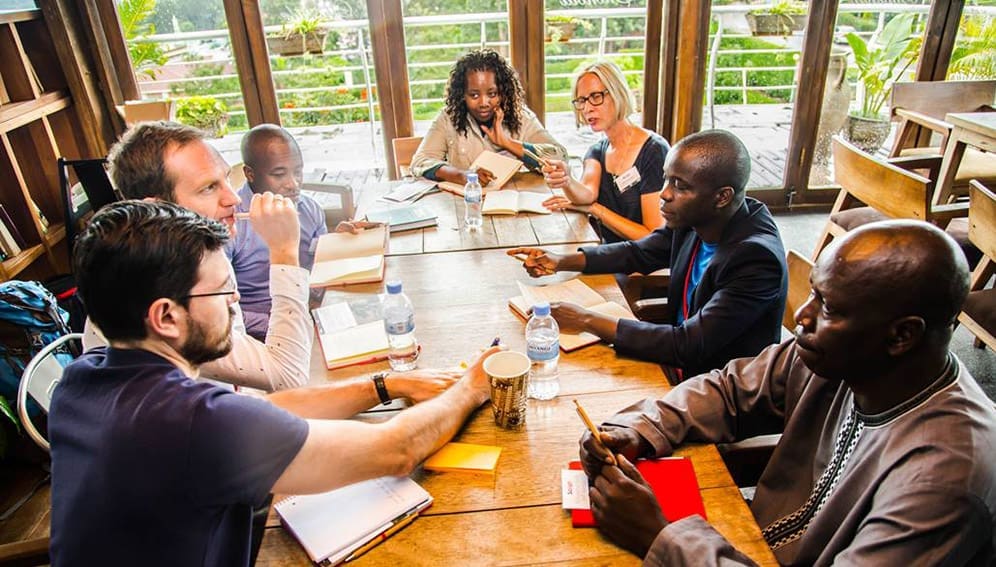
Image: Scientists explain their research to journalists at a Script networking event.
30/05/19
Script Practical Guide
How to find the right journalist to report on your research
Speed read
- The ability to understand science and report on it is not every journalist’s cup of tea
- Finding the right journalist will address most scientists’ fears about the media
- After finding the right journalist you need to maintain good relations with them
By: Charles Wendo
Why you need the right journalist
What the right journalist should be able to do
Categories of journalists who might report science
Finding the right journalist
Once you’ve found the right journalist…
And finally, be the right scientist
On the other hand you might have seen some award-winning science stories reported in the media. What makes the difference?
Publication of a story in the media depends on a number of factors, most importantly the journalists’ ability to gather information from the right sources, make sense of it and package a clear, accurate and relatable story.
Some journalists will write better science stories than others – often this relates to their training and experience. Rather than generalising journalists and avoiding the media for fear that they might distort your information, it is better to invest some time and energy in finding the right journalist to work with. Most of the fears that scientists have about the media can be overcome by working with the right journalist.
What the right journalist should be able to do
- Have some knowledge about how research is carried out
- Know the right sources of news about science
- Know how to spot science news
- Package scientific information into a clear and accurate story that is understandable and relatable to non-scientists
- Show interest in reporting the science and how it affects society, rather than focusing on drama and scandal.
Categories of journalists who might report science
- Specialised science journalists: These specialise in reporting about science issues. With experience they become better at it. They keep up-to-date with scientific developments. They have a good idea what questions to ask, where to find the right people to interview, how to get the right documents to read and websites to visit for additional information. Some begin with journalism training and learn science. Others begin with a scientific background and then learn journalism.
- Unspecialised journalists who show interest in and occasionally report on science issues: Due to staff shortage, lack of prioritisation or other factors, some media organisations do not let their journalists focus only on science even if the journalist is interested. There are also journalists who want to report on science without giving up other topics. For these two reasons you may find unspecialised journalists who occasionally report on science.
- Unspecialised journalists who report on science when they have to: Some science-related stories will occur in unlikely places such as Parliament or Courts of Law, so the available journalist at the moment will report on them. Take for instance when a scientist makes a presentation to Members of Parliament, or an issue of scientific nature is debated in the House.
Finding the right journalist
Notice who covers science stories in newspapers and broadcast media
Once you’ve found the right journalist…
Having found the right journalist, you need to maintain good relations with them. Do not go to them only when you want media coverage. After building rapport with journalists you may brief them about your research in the earlier phases to prepare them to report on it when you have something newsworthy to announce. This requires you to explain to them that the initial information that you are providing is preliminary and only for informational purposes, not for reporting.
Below are five things you can do to keep a good rapport with journalists after the initial icebreaker:
- Let them know when something newsworthy is happening in the scientific world that they otherwise would not know about.
- Read, listen to or watch their stories and give them constructive feedback.
- Give them picture opportunities, for example by granting them access to your laboratories or interesting field activities.
- Inform them about training opportunities that you might be aware of.
- If you invite journalists to a workshop, encourage them to attend the sessions and not walk away after the opening ceremony.
One might argue that it is the journalists’ responsibility to report and not the scientists’ job to motivate them; however, don’t forget they have other topics to report on. If you are interested in getting the media to report on science and your research in particular, you’ve got to work at it a bit.

